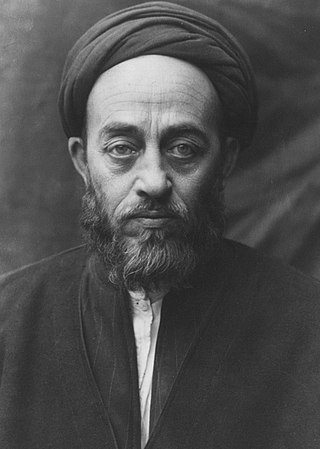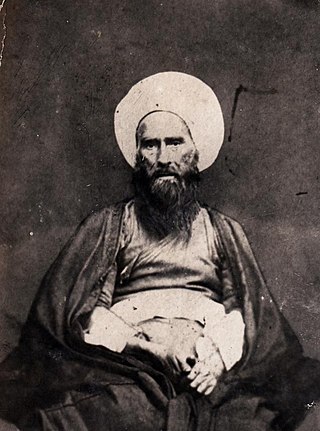
Jalāl al-Dīn Muḥammad Rūmī, also known as Jalāl al-Dīn Muḥammad Balkhī, Mevlânâ/Mawlānā and Mevlevî/Mawlawī, but more popularly known simply as Rumi, was a 13th-century Persian poet, Hanafi faqih, Islamic scholar, Maturidi theologian and Sufi mystic originally from Greater Khorasan in Greater Iran. Rumi's influence transcends national borders and ethnic divisions: Iranians, Tajiks, Turks, Greeks, Pashtuns, other Central Asian Muslims, as well as Muslims of the Indian subcontinent have greatly appreciated his spiritual legacy for the past seven centuries. His poems have been widely translated into many of the world's languages and transposed into various formats. Rumi has been described as the "most popular poet" and the "best selling poet" in the United States.

Seyyed Hossein Nasr is an Iranian philosopher and University Professor of Islamic studies at George Washington University.

Abdolkarim Soroush (عبدالكريم سروش Persian pronunciation: [æbdolkæriːm soruːʃ]; born Hossein Haj Faraj Dabbagh, is an Iranian Islamic thinker, reformer, Rumi scholar, public intellectual, and a former professor of philosophy at the University of Tehran and Imam Khomeini International University. He is arguably the most influential figure in the religious intellectual movement of Iran. Soroush is currently a visiting scholar at the University of Maryland in College Park, Maryland. He was also affiliated with other institutions, including Harvard, Princeton, Yale, Columbia, the Leiden-based International Institute as a visiting professor for the Study of Islam in the Modern World and the Wissenschaftskolleg in Berlin. He was named by Time magazine as one of the world's 100 most influential people in 2005, and by Prospect magazine as one of the most influential intellectuals in the world in 2008. Soroush's ideas, founded on relativism, prompted both supporters and critics to compare his role in reforming Islam to that of Martin Luther in reforming Christianity.

Muhammad Husayn Tabataba'i or Sayyid Mohammad Hossein Tabataba'i was an Iranian scholar, theorist, philosopher and one of the most prominent thinkers of modern Shia Islam. He is perhaps best known for his Tafsir al-Mizan, a twenty-seven-volume work of tafsir, which he produced between 1954 and 1972. He is commonly known as Allameh Tabataba'i and the Allameh Tabataba'i University in Tehran is named after him.

The Iranian Research Institute of Philosophy is a public research institute in Tehran, Iran.

Hossein Mohyeddin Ghomshei better known as Elahi Ghomshei, is an Iranian scholar, philosopher, author, and lecturer on literature, art, and mysticism.
Henry Corbin was a French philosopher, theologian, and Iranologist, professor of Islamic studies at the École pratique des hautes études. He was influential in extending the modern study of traditional Islamic philosophy from early falsafa to later and "mystical" figures such as Suhrawardi, Ibn Arabi, and Mulla Sadra Shirazi.

The Isfahan School is a school of Islamic philosophy. It was founded by Mir Damad and reached its fullest development in the work of Mulla Sadra. The name was coined by Seyyed Hossein Nasr and Henry Corbin.
Iranian philosophy or Persian philosophy can be traced back as far as to Old Iranian philosophical traditions and thoughts which originated in ancient Indo-Iranian roots and were considerably influenced by Zarathustra's teachings. According to the Oxford Dictionary of Philosophy, the chronology of the subject and science of philosophy starts with the Indo-Iranians, dating this event to 1500 BC. The Oxford dictionary also states, "Zarathustra's philosophy entered to influence Western tradition through Judaism, and therefore on Middle Platonism."

William C. Chittick is an American philosopher, writer, translator and interpreter of classical Islamic philosophical and mystical texts. He is best known for his work on Rumi and Ibn 'Arabi, and has written extensively on the school of Ibn 'Arabi, Islamic philosophy, and Islamic cosmology.

Hadi Sabzavari or Hajj Molla Hadi Sabzavari was an Iranian philosopher, mystic theologian and poet.

Sachiko Murata is Japanese scholar of comparative philosophy and mysticism and a professor of religion and Asian studies at Stony Brook University. She is a 2011 Guggenheim Fellow.

Dr Ali Murad Davudi (1922–1979?) was an Iranian Baháʼí who was a member of the national governing body of the Baháʼís in Iran. He was a professor at Tehran University in the philosophy department. In 1979, during a wave of persecution toward Baháʼís, he was kidnapped and has been presumed a victim of state execution.
Avicennism is a school of Persian philosophy which was established by Avicenna. He developed his philosophy throughout the course of his life after being deeply moved and concerned by the Metaphysics of Aristotle and studying it for over a year. According to Henry Corbin and Seyyed Hossein Nasr, there are two kinds of Avicennism: Islamic Avicennism, and Latin Avicennism. According to Nasr, the Latin Avicennism was based on the former philosophical works of Avicenna. This school followed the Peripatetic school of philosophy and tried to describe the structure of reality with a rational system of thinking. In the twelfth century AD, it became influential in Europe, particularly in Oxford and Paris, and affected some notable philosophers such as Thomas Aquinas, Roger Bacon and Duns Scotus. While the Latin Avicennism was weak in comparison with Latin Averroism, according to Étienne Gilson there was an "Avicennising Augustinism". On the other hand, Islamic Avicennism is based on his later works which is known as "The Oriental Philosophy". Therefore, philosophy in the Eastern Islamic civilization became close to gnosis and tried to provide a vision of a spiritual universe. This approach paved the road for the Iranian school of Illuminationism by Suhrawardi.
Hossein Ziai was a professor of Islamic Philosophy and Iranian Studies at UCLA where he held the inaugural Jahangir and Eleanor Amuzegar Chair in Iranian Studies until his passing. He received his B.S. in Intensive Physics and Mathematics from Yale University in 1967 and a Ph.D. in Islamic Philosophy from Harvard University in 1976. Prior to UCLA, Ziai taught at Tehran University, Sharif University, Harvard University, Brown University, and Oberlin College. As Director of Iranian Studies at UCLA, where he taught since 1988, Ziai established an undergraduate major in Iranian in the Department of Near Eastern Languages and Cultures—the first such degree in North America—and developed the strongest and most rigorous Iranian Studies program in the U.S.
Mehdi Aminrazavi is an Iranian scholar of philosophy and mysticism. He is the Kurt Leidecker Chair in Asian Studies and a professor of philosophy and religion as well as director of the Center for Middle Eastern Studies Program at the University of Mary Washington.
Mohammad Hassan Faghfoory is an Iranian-American Islamic scholar and professor of Islamic studies at the George Washington University in Washington, D.C.

Insha-Allah Rahmati is an Iranian philosopher, thinker, translator and a full professor of philosophy at Islamic Azad University in Tehran. His main interests are Ethics, Islamic philosophy and Traditionalist School (perennialism).

Islamic Philosophy from its Origin to the Present: Philosophy in the Land of Prophecy is a book by Seyyed Hossein Nasr, Iranian philosopher and University Professor of Islamic studies at George Washington University, including a comprehensive overview of Islamic philosophy from the 9th century to the present day.













